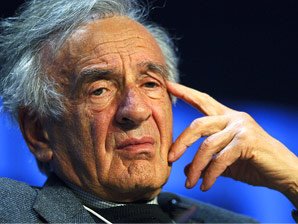Elie Wiesel adds a new twist to his Buchenwald liberation tale
Saturday, May 19th, 2012
by Carolyn Yeager
To cry or not to cry, that is the question.
Elie Wiesel, as usual, cannot make up his mind.
On May 6, he gave a major speech (for big bucks) at Xavier University in Cincinnati, brought there by the Center for Holocaust and Humanity Education. A reporter who covered the speech wrote that Wiesel said this:
Wiesel recounted his rescue from the concentration camp by the U.S. Army and said he remains grateful.
“We cried,” he recalled. “We discovered for the first time that we could cry.”
But in an interview that was published on the following day, May 7, on NBC New York, Wiesel said the opposite to reporter Gabe Pressman:
He told me about the day the American army came to liberate the prisoners,
How the prisoners “wanted to cry but they didn’t know how to cry… if you cry, you will never stop so they didn’t even do that.”
So which is it? Did they cry or didn’t they? It seems you get to choose which version you like best.
I pointed out in this article on the Xavier speech that this was the first time I had ever heard or read Elie Wiesel say that he or his barracks-mates cried. Since this Blog takes the position that Wiesel was not even there (in Buchenwald), it’s kind of a mute point–except for the fact that it’s one more reason not to believe he was there. He can’t keep his “story” about it straight.
Wiesel embellished his Buchenwald liberation tale when he was interviewed by Oprah Winfrey, too. As I recounted in this article, he told Oprah in Nov. 2000 that the first thing the religious boys in his barracks did was to “reassemble” and offer prayers for the dead–yet in his books he made a point to say the only thing anyone did was go after the food provisions. He wrote that they had no thought of their families nor of friends, only of food.
The flexibility of memory
Considering all this, we arrive at a crucial question about the Holocaust. The fate of nations may hang on it! What does it mean if Memory, that sacred human ability on which the entire holocaust narrative rests, cannot be depended upon?
Elie Wiesel’s memory is clearly not reliable. Yet he himself has made everything depend on memory. He wrote: “I shall never forget that night, the first night in camp […] never shall I forget those moments … ” and so on. But he must have forgotten some things since his story doesn’t remain consistent.
Memory itself–the act of remembrance–is just not what Elie Wiesel makes it out to be. For Weisel, it’s more like these words he is famous for saying: Some things are true though they didn’t happen, while others are not, even if they did. That is how we tend to remember!
In his case, Elie Wiesel was liberated from Buchenwald, even if he wasn’t … and it’s not true that the prisoners were only interested in food, even if they were. Memory–it’s such a flexible thing.
Category Featured | Tags: Tags: Buchenwald liberation, Elie Wiesel, Holocaust fraud, memory, Oprah Winfrey,
Social Networks: Facebook, Twitter, Google Bookmarks, del.icio.us, StumbleUpon, Digg, Reddit, Posterous.


